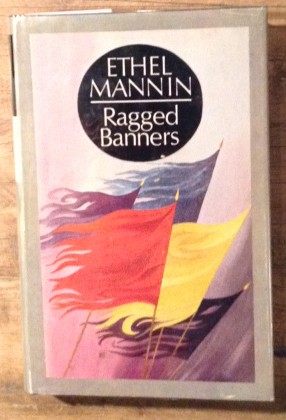Inspiring Older Readers
 posted on 18 Aug 2016
posted on 18 Aug 2016
Ragged Banners by Ethel Mannin
This novel was published in 1931 and could only really have been written in the friable atmosphere of those inter-war years. It could also only have been produced by someone with an essentially non-conformist, politically liberal, proto-feminist, middle class sensibility - a profile that fits Mannin to a tee.
The story centres on a small cast of 'types' who revolve around the central figure of Anthony Starridge who is the only son of stolid, unimaginative bourgeois parents. Beautiful but essentially unworldly - even etherial - Starridge is committed only to discovering himself and in trying to capture the fantastic mystery of experience. He writes, slowly, obscure verse that hints at brilliance without ever achieving that status. Cut-off financially by his despairing parents, Starridge allows himself to drift in pursuit of some unspecified revelation, systematically alienating all human contact and living virtually as if he were a religious aesthetic.
However, his refusal to make links with other people doesn't mean he goes unnoticed - his odd behaviour, his embrace of suffering and his breathtaking beauty means he finds saviours even when he isn't seeking them. The first person to step into the breach is Stephen Latimer, a cynical, middle class communist dilettante who 'edits' a left-wing newspaper but who, in reality, is nothing more than a hard-nosed socialite. At first, however, Starridge is beguiled by Latimer and agrees to go with him to his rather spartan retreat in the hills of Italy. Their relationship becomes increasingly complex and potentially explosive until an ex-lover of Latimer's appears on the scene, the writer and journalist Mary Thane.
Starridge transfers his Platonic fascination with Latimer to one of equal intensity with Mary - a divorcee who refuses to abide by the social conventions attached as a matter of course to her gender. There is, you suspect, more than a hint of the author herself in the character of Mary. However, the short time of relative calm and tranquillity they share together in Italy is brought to a catastrophic conclusion by the intercession of Starridge's parents who are morally outraged that their only son might be living in sin with a divorced woman - even if the relationship isn't a sexual one. Anthony's fragile mental state is once again tested to it's maximum and Mannin has already planted plenty of explicit hints that tragedy lies ahead for a man like Starridge who is more like some essential spirit than human being.
The final stage in the unfolding tragedy takes place in Germany when Anthony runs away from both Mary and his parents seeking sanctuary in somewhere he feels compelled to visit. Here in Frankfurt his fate will be sealed in a tragic and desperate menage-a-tois with Max and Wanda - Wander-Vogel or 'wondering birds', young German's hiking and travelling the countryside. The final dramatic denouement is something I will leave you to discover - although I should warn you that it is rather melodramatic and overwrought.
The 'ragged banners' of the title is a reference to the flags of identity and commitment we run up throughout our life and how, despite the battles we fight and the toll this takes on us, every time we feel inclined to lower these banners we find ourselves raising them again - it's the nature of the human spirit. Living in this world is all about compromise and knowing when we retreat and when we rally to fight our corner - Anthony Starridge couldn't live in this world simply on a commitment to nature and beauty and was never going to be enough to make him human. What he needed was some measure of the steadiness of his parents, the cynicism of Latimer, the caring nature of Mary, his love of Max and his hatred for Wanda - without these essential characteristics there was simply not enough to anchor him to this world.
Terry Potter
August 2016